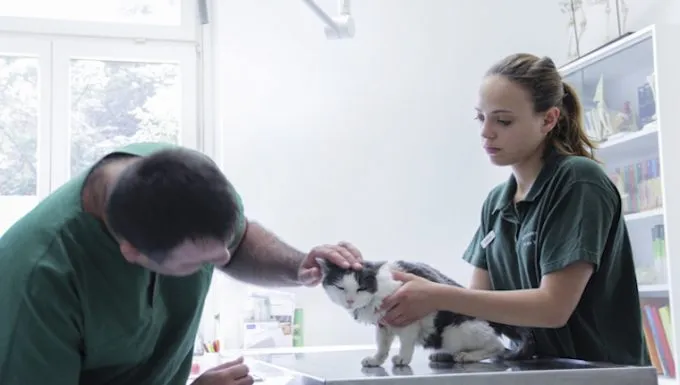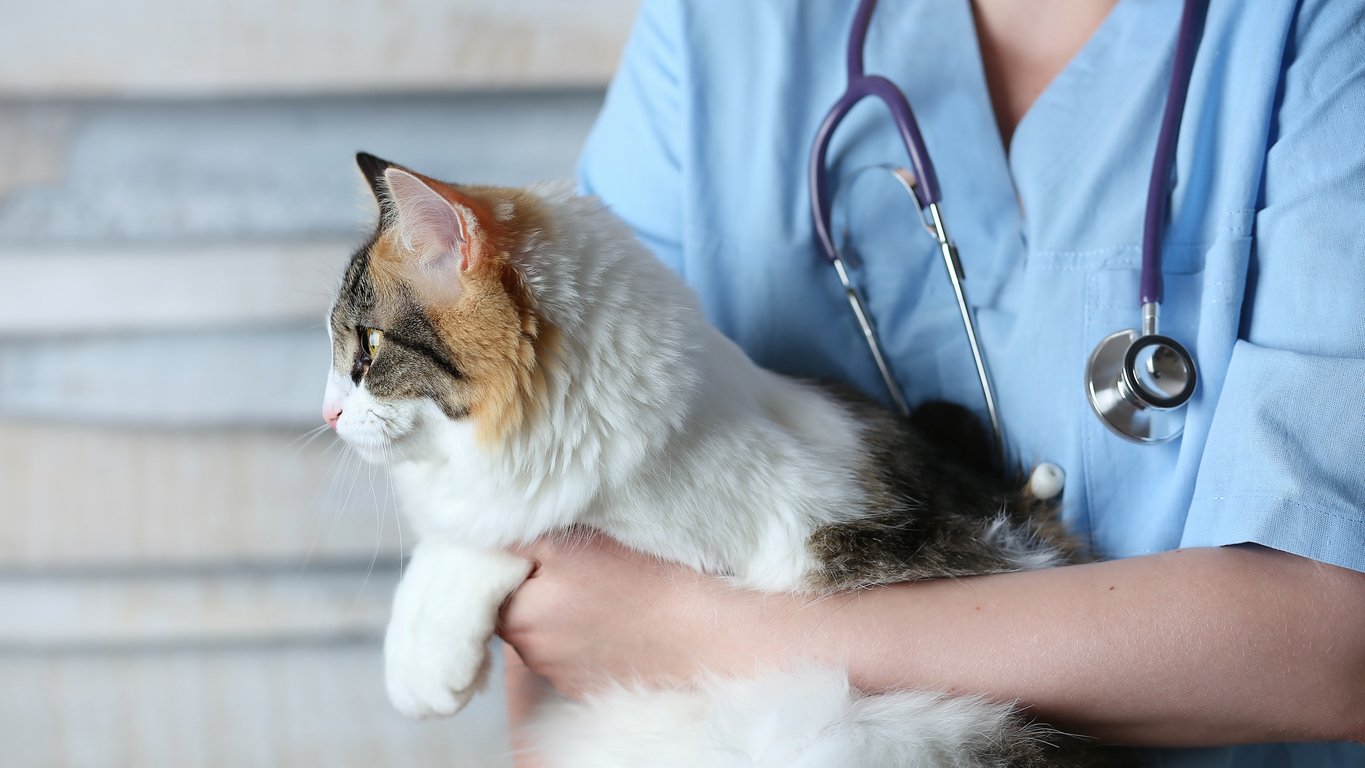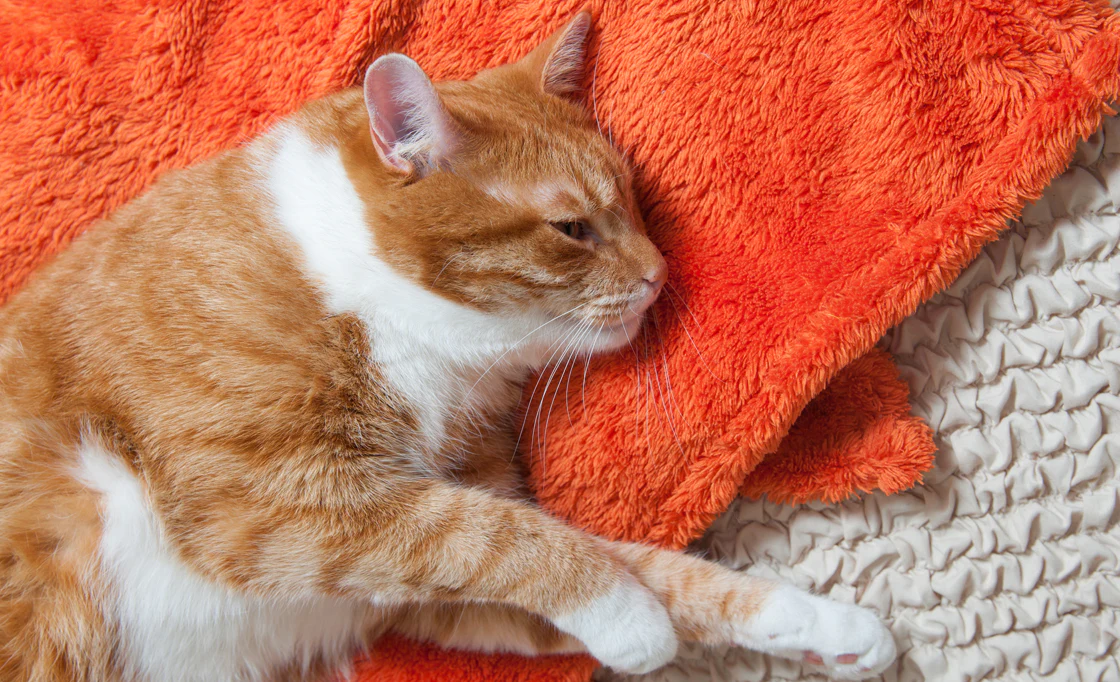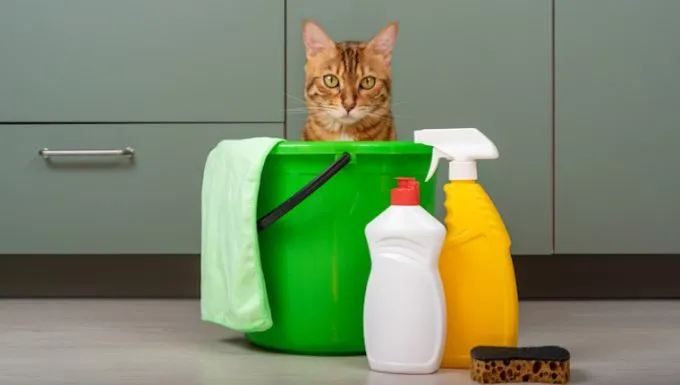Causes of Ethanol Poisoning in Cats
Exposure to Alcohol-Containing Substances

Cats can develop ethanol poisoning when they ingest substances containing alcohol (ethanol)
The primary cause of ethanol poisoning in cats is exposure to alcohol-containing substances such as beer, wine, liquor, and even foods that have been cooked with alcohol like baked goods or desserts.
Other common sources of ethanol toxicity in cats include medications, cleaning supplies, mouthwash, perfume, cosmetics, cough medicines, antiseptic sprays, certain plants (like sago palms), and fermented foods such as bread dough, fruitcakes, and candies.
Cats may also ingest ethanol through drinking contaminated water or being near a spilled beverage containing alcohol.
Additionally, cat owners should be aware that some human medications contain, and even small amounts can harm cats.
Ingestion of any substance containing ethanol can be hazardous for cats due to their sensitive liver and kidney function. The severity of the symptoms depends on several factors such as the amount consumed, duration of exposure, weight of the cat, age, and individual sensitivity.
Common signs of ethanol poisoning in cats include
seizures, loss of coordination, respiratory depression, tremors, and coma. If you suspect your cat has ingested a substance containing ethanol, contact the ASPCA’s Animal Poison Control Center at (888) 426-4435.
A veterinarian can provide immediate medical attention to help manage the poisoning by administering fluids, medication, and monitoring vital signs. In severe cases, supportive care may be necessary to treat respiratory failure, seizure control, or other complications related to ethanol toxicity.
Prevention is key in avoiding ethanol poisoning in cats. Always store human medications and household products containing alcohol securely out of reach, and be mindful of your cat’s curiosity and tendency to ingest anything that tastes good to them. Regularly inspecting your home and yard for potential hazards can help minimize risks.
Cats can ingest ethanol through accidental consumption of alcoholic beverages, cleaning products, or other household chemicals
Cats can ingest ethanol through accidental consumption of alcoholic beverages, cleaning products, or other household chemicals. This can occur when a cat knocks over a container containing alcohol, laps up spills, or even eats substances that have been contaminated with ethanol.
Alcoholic beverages are one of the most common sources of ethanol poisoning in cats. This can happen when a pet ingests beer, wine, spirits, or other types of liquor. The severity of the poisoning depends on several factors, including the amount and concentration of alcohol consumed, as well as the weight and sensitivity of the cat.
Cleaning products are another common source of ethanol poisoning in cats. Many household cleaners contain high levels of ethanol, which can be toxic to cats if ingested. These products may include disinfectants, sanitizers, and other chemicals used for cleaning and maintenance purposes.
Other household chemicals that may contain ethanol include:
Paints and varnishes
Cleaning fluids for floors and surfaces
Air fresheners and deodorizers
Pest control products, such as flea and tick sprays
It’s essential to keep these substances out of reach of your cat and store them safely. If you suspect that your cat has ingested any of these substances, contact a veterinarian or a pet poison hotline immediately.
In addition to accidental ingestion, there are other causes of ethanol poisoning in cats. These may include:
Intentional ingestion by the cat
Mixing with food or treats that contain ethanol
Breathing in fumes from substances containing ethanol
Other medical conditions, such as kidney disease or diabetes, that may affect a cat’s metabolism and increase the risk of ethanol poisoning.
If you suspect that your cat has ingested ethanol or is showing signs of ethanol poisoning, seek immediate veterinary care. The veterinarian will perform diagnostic tests to determine the level of alcohol in the blood and assess the severity of the poisoning.
The American Association of Feline Practitioners notes that even small amounts of ethanol can be toxic to cats due to their relatively low body weight and high metabolism
Cats are highly susceptible to ethanol poisoning due to their unique physiology and behavior.
The first factor contributing to this susceptibility is a cat’s relatively low body weight compared to other animals.
A typical adult domestic cat weighs between 8-12 pounds (3.5-5.5 kilograms), making them much smaller than humans or dogs of similar age.
This small body size means that even tiny amounts of ethanol can cause significant toxicity in cats, as the substance has a disproportionate effect on their bodily functions.
Another crucial factor is a cat’s high metabolism rate compared to other animals.
Cats are obligate carnivores and require a diet rich in protein and fat to maintain optimal health, which leads to a more rapid metabolism of toxins.
As a result, even small amounts of ethanol can be quickly absorbed and distributed throughout the cat’s body, causing damage to multiple organ systems before it is excreted.
The consumption of alcohol-containing substances such as wine, beer, or liquor also poses a significant risk to cats, especially if they ingest these materials through their food or water bowls.
Cats may be attracted to the smell and taste of fermented beverages, leading them to lick or drink from containers left unattended by their owners.
Lastly, certain medical conditions can increase a cat’s susceptibility to ethanol poisoning, such as liver disease or impaired kidney function.
In these cases, even small amounts of ethanol can accumulate in the bloodstream and cause severe toxicity due to the compromised ability of the kidneys and liver to clear the substance from the body.
As stated by the American Association of Feline Practitioners, it is essential for cat owners to be aware of the risks associated with ethanol poisoning and take steps to prevent their pets from accessing potentially toxic substances.
This includes keeping fermented beverages out of reach of curious cats and monitoring their food and water bowls closely to ensure that they are not contaminated with alcohol-containing materials.
Early recognition of symptoms such as lethargy, vomiting, and difficulty breathing is crucial for prompt treatment and a favorable outcome in cases of ethanol poisoning in cats.
Pet owners who suspect their cat has ingested an alcoholic substance should seek immediate veterinary attention to ensure proper diagnosis and treatment by a qualified veterinarian.
Symptoms of Ethanol Poisoning in Cats
Moderate to Severe Symptoms
Cat owners need to be aware of the risks associated with ethanol poisoning in their pets. Ethanol, also known as alcohol or ethyl alcohol, is a toxic substance that can cause serious harm to cats if ingested in sufficient quantities.
Causes of Ethanol Poisoning in Cats
Ethanol poisoning in cats can occur when they ingest foods or substances containing ethanol, such as:
Foods and beverages with high alcohol content, including beer, wine, and liquor
Medications that contain ethanol, such as cough syrups and certain antidepressants
Household products that contain ethanol, like cleaning solutions and perfumes
Symptoms of Ethanol Poisoning in Cats: Moderate to Severe Symptoms
Cat owners should be aware of the following moderate to severe symptoms of ethanol poisoning in cats:

Treatment of Ethanol Poisoning in Cats
Immediate veterinary attention is crucial for cats showing moderate to severe symptoms of ethanol poisoning. Treatment may involve:
Prevention is key when it comes to avoiding ethanol poisoning in cats. Keep all toxic substances out of reach, store them safely, and dispose of them properly. If you suspect your cat has ingested a substance containing ethanol or exhibits any symptoms mentioned above, seek immediate veterinary attention.
Vomiting and diarrhea
Ethanol poisoning, also known as ethanol toxicity or alcohol poisoning, occurs when a cat ingests a toxic amount of ethanol, often from consuming alcoholic beverages, food products containing ethanol, or other sources such as mouthwash, cough syrup, and antifreeze.
The symptoms of ethanol poisoning in cats can be quite varied and may progress rapidly depending on the severity of the exposure, the concentration of ethanol consumed, and individual factors such as the cat’s weight, age, and overall health.
Early signs of ethanol poisoning in cats often include:
1. Lethargy: A decrease in activity level and a lack of response to surroundings or stimuli, which can be mistaken for normal behavior or depression.
2. Vomiting: This may start immediately after exposure or within hours later, depending on the dose consumed.
3. Diarrhea: Vomiting and diarrhea are key indicators of gastrointestinal irritation caused by ethanol.
4. Bloody vomiting: In severe cases, the vomit may contain blood due to irritation of the stomach lining.
5. Incoordination or staggering
6. Loss of balance and coordination
7. Lack of reflexes
8. Seizures: In more severe cases, ethanol poisoning can lead to seizures in cats.
9. Collapse or loss of consciousness: This is an extreme sign of advanced poisoning and requires immediate veterinary attention.
The exact progression of symptoms and their severity vary depending on several factors:
– The concentration and volume of ethanol consumed.
– The duration of exposure to the toxic substance.
– Individual tolerance or sensitivity to ethanol, which can depend on age, health conditions, weight, and other factors.
It is crucial to note that cats are more sensitive to ethanol than humans due to their smaller body size and metabolism rate.
In cases of suspected ethanol poisoning in cats, immediate veterinary attention is necessary for proper treatment and support. If you suspect your cat has ingested a toxic amount of alcohol, contact your veterinarian or a pet poison hotline (such as the ASPCA Animal Poison Control Center at 1-888-426-4435) without delay.
Abnormal gait or staggering
Cats can experience ethanol poisoning if they ingest products containing ethanol, such as beer, wine, liquor, or certain medications.
The severity and duration of symptoms depend on several factors including the amount and concentration of ethanol consumed by the cat, the individual cat’s sensitivity to ethanol, and whether the cat has eaten before consuming ethanol-containing substances.
Abnormal gait or staggering may be a sign that a cat has ingested something containing ethanol. In addition, other symptoms may appear in cats with varying degrees of severity and urgency.
Vomiting, often with a strong odor reminiscent of alcohol
Lack of coordination or stumbling due to impaired motor function and balance
Nervous system depression characterized by lethargy, confusion, agitation, restlessness, or tremors
Pupil dilation
CNS depression, which can lead to coma in severe cases
Lack of coordination when performing voluntary actions
Loss of muscle tone or weakness
Apart from the physical symptoms, cats may display behavioral changes such as anxiety, restlessness, agitation, confusion, and loss of interest in their surroundings.
The cat’s vital signs, including its heart rate, breathing rate, body temperature, and overall demeanor, should be closely monitored for any signs of distress or danger. It is also recommended to keep an eye out for other signs of poisoning such as seizures, muscle tremors, difficulty walking, and excessive drooling.
Since cats can quickly develop severe symptoms if left untreated, it’s crucial to seek veterinary attention immediately if you suspect that your cat has ingested something containing ethanol. Your veterinarian may perform blood tests or conduct a physical examination to determine the severity of poisoning.
Loss of coordination and balance
Cats can suffer from ethanol poisoning if they ingest small amounts of alcoholic beverages or foods containing ethanol, such as beer, wine, or liquor.
Early symptoms of ethanol poisoning in cats may include:
Sudden changes in behavior, such as agitation, aggression, and confusion
Loss of coordination and balance, leading to difficulty walking or standing
Increased salivation or drooling
Pupil dilation or constriction
Staggering gait or difficulty walking in a straight line
In more severe cases of ethanol poisoning, cats may exhibit the following symptoms:
Respiratory depression or slow breathing rate
Decreased heart rate
Coma or loss of consciousness
Seizures
Nausea and vomiting
It is essential to seek veterinary care immediately if you suspect your cat has ingested ethanol or exhibits any symptoms of poisoning.
A veterinarian can diagnose ethanol poisoning based on a physical examination, medical history, and laboratory tests.
Treatment for ethanol poisoning typically involves supportive care, such as:
Fluid therapy to manage dehydration
Avoiding further exposure to ethanol
Oxygen therapy if respiratory depression is present
Pain management
Nursing care to monitor vital signs and provide emotional support
Recovery from ethanol poisoning in cats depends on the severity of symptoms, prompt treatment, and veterinary care.
Shallow breathing or slow heart rate, as reported by the University of California, Davis Veterinary Medical Teaching Hospital
The symptoms of ethanol poisoning in cats can be subtle and may not always be immediately noticeable, but they can be severe and potentially life-threatening if left untreated.
According to various veterinary sources, including the University of California, Davis Veterinary Medical Teaching Hospital, some common symptoms of ethanol poisoning in cats include:
Lethargy: Cats may become weak, disoriented, and unresponsive due to ethanol’s effects on the central nervous system.
Vomiting: Cats may vomit repeatedly after ingesting ethanol-containing substances, which can lead to dehydration and electrolyte imbalances.
Diarrhea or abdominal pain: Ethanol can cause gastrointestinal upset, leading to diarrhea, abdominal pain, and other symptoms.
Seizures or tremors: In severe cases of ethanol poisoning, cats may exhibit seizures or tremors due to the toxic effects on the brain and nervous system.
Coma: In extreme cases, cats may become comatose if they are not treated promptly and effectively for ethanol poisoning.
It is essential to note that these symptoms can progress rapidly and unpredictably in individual cats, making prompt veterinary attention crucial for effective treatment and prevention of long-term damage or death.
Treatments for Ethanol Poisoning in Cats
Supportive Care and Monitoring
Cats exposed to ethanol can suffer from acute or chronic poisoning depending on the dose and duration of exposure.
Acute ethanol intoxication occurs when a cat ingests a significant amount of ethanol-containing substance within a short period, resulting in symptoms such as ataxia, lethargy, confusion, and loss of coordination.
The most common causes of ethanol poisoning in cats include accidental ingestion of alcohol-based products, eating fermented foods or beverages, and consuming certain medications that contain ethanol as an excipient.
Treatment for ethanol poisoning in cats focuses on supportive care to manage symptoms, stabilize the cat’s condition, and prevent further exposure to ethanol.
Supportive care may include:
Rapid stabilization of vital functions through oxygen therapy, fluid administration, and monitoring of cardiovascular stability.
Pain management using analgesics such as buprenorphine or butorphanol
Antiemetics to manage vomiting and prevent dehydration.
The use of activated charcoal may be considered within a narrow time frame after exposure (ideally < 1 hour post ingestion) to reduce ethanol absorption in the stomach, but its effectiveness is still debated among veterinarians.
Monitoring includes close observation of the cat’s respiratory rate, heart rate, blood pressure, and neurological status, as well as regular checks on the cat’s vital signs and clinical condition.
Avoiding any further exposure to ethanol or its metabolites until the treatment is completed.
Maintenance of a safe environment with minimal stress to prevent exacerbation of symptoms.
When possible, provide nutritional support through subcutaneous fluids administration to help stabilize blood chemistry and reduce dehydration risk
The veterinarian may consider administering medications like flumazenil or fomepizole to counteract the effects of ethanol if they are deemed necessary based on the cat’s condition and severity of exposure.
Induction of vomiting to remove remaining ethanol from the stomach

Treatments for Ethanol Poisoning in Cats typically involve a combination of supportive care and medication to manage symptoms and prevent further complications.
The primary goal of treatment is to remove the ethanol from the cat’s body as quickly and safely as possible.
One of the first steps in treating ethanol poisoning in cats is to induce vomiting. This can be done using a medication such as apomorphine or xylazine, which stimulates the cat’s gag reflex and promotes vomiting.
The induction of vomiting can help to remove any remaining ethanol from the stomach, thereby reducing the absorption of the toxin into the bloodstream.
However, it’s essential to note that inducing vomiting should only be done under the guidance of a veterinarian, as there are risks associated with this procedure, particularly if the cat is already showing signs of severe poisoning or has ingested other substances that could interfere with treatment.
Once vomiting has been induced, the veterinarian may administer activated charcoal to help adsorb any remaining ethanol in the stomach and intestines, thereby reducing its absorption into the bloodstream.
Supportive care measures may also be necessary to manage symptoms such as tremors, seizures, or respiratory distress. These can include oxygen therapy, fluid administration, and monitoring of vital signs.
Medications may be given to control seizures, tremors, or other symptoms, depending on the severity of the poisoning and the cat’s overall condition.
In severe cases of ethanol poisoning in cats, hospitalization may be necessary for close monitoring and supportive care.
The prognosis for cats with ethanol poisoning depends on several factors, including the amount of ethanol ingested, the time elapsed since ingestion, and the promptness and effectiveness of treatment.
Activated charcoal administration to prevent further absorption
Treatments for Ethanol Poisoning in Cats
Administer activated charcoal to prevent further absorption of ethanol. This can be done orally or through a nasogastric tube. The goal is to saturate the digestive tract and prevent the cat from absorbing any more alcohol.
Induce vomiting may not be recommended as it can cause more harm than good, especially if the cat has already ingested a large amount of ethanol. However, if the cat is showing severe symptoms such as seizures or difficulty breathing, inducing vomiting under close supervision by a veterinarian may be necessary.
Supportive care is crucial in managing ethanol poisoning in cats. This includes:
Maintenance fluids to prevent dehydration and electrolyte imbalance
Cardiac monitoring for potential arrhythmias and other cardiac issues
Oxygen therapy to help alleviate hypoxia and respiratory distress
Pain management as needed to address discomfort or pain caused by the poisoning
Antidotes, such as fomepizole or ethanol, may be administered to counteract the effects of ethanol. Fomepizole is generally used in cases where severe toxicity is suspected, while ethanol can be given in milder cases.
In some cases, hospitalization for close monitoring and treatment may be necessary. Cats with a history of ethanol exposure or those who have ingested large amounts should be closely monitored by a veterinarian.
Fluid therapy and cardiac monitoring as needed, according to the American College of Veterinary Internal Medicine
The primary goal of treating ethanol poisoning in cats is to support vital organs and maintain overall bodily functions. Fluid therapy plays a crucial role in this process by replenishing lost fluids and helping to stabilize the cat’s blood pressure.
According to the American College of Veterinary Internal Medicine, fluid administration should be initiated promptly to help counteract the dehydrating effects of ethanol on the body. The type and rate of fluid administered will depend on the severity of the poisoning and the individual cat’s response to treatment.
In addition to fluid therapy, close cardiac monitoring is also essential in managing cats with ethanol poisoning. This involves closely monitoring the cat’s heart rate and rhythm using electrocardiogram (ECG) machines or other diagnostic tools.
The veterinarian may also administer medications to help manage the effects of ethanol on the heart, such as beta blockers or atropine. These medications can help slow down the heart rate and improve cardiac output.
In some cases, cats with severe ethanol poisoning may require hospitalization for close monitoring and supportive care. This may involve administering IV fluids, providing oxygen therapy, and managing any underlying medical conditions that may be contributing to the poisoning.
The prognosis for cats with ethanol poisoning varies depending on the severity of the poisoning and the promptness and effectiveness of treatment. In general, cats that receive timely and appropriate care tend to have better outcomes than those that are delayed in seeking veterinary attention.
It’s essential to note that prevention is the best medicine when it comes to ethanol poisoning in cats. Pet owners can take steps to prevent their cats from accessing ethanol by keeping all household cleaners, chemicals, and alcoholic beverages out of reach and securely stored.
- Best Hunter.io Alternatives for 2025 - April 19, 2025
- Best Lead411 Alternatives for 2025 - April 19, 2025
- Best Leadzai Alternatives for 2025 - April 18, 2025



